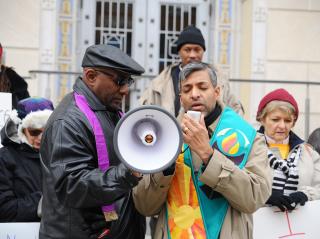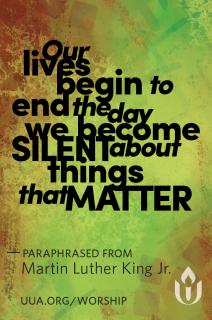Visitors in the Struggle for Racial Justice
No matter what tactics and methods racial justice activists use, the general response of society will be a collective head-shaking and tsk-tsk-ing — because what people are actually complaining about are not the specific tactics that are being used in the struggle for racial justice, but that the struggle for racial justice exists at all.
I imagine that for most people, the immediate reaction to that statement is defensiveness. “I really don’t think that the struggle for racial justice shouldn’t exist,” some might respond. “I just think there are better ways to go about it than blocking traffic and making me late for work. I get annoyed and frustrated and it really doesn’t convince me to join your fight.”
What, exactly, is going to convince that person to join the fight? Picket signs on the side of the road? Then they’ll just think, “Look at those troublemakers disturbing the peace over there,” as they drive on their way to work. Then they’ll promptly forget about it.
It’s not the specific methods that are making people uncomfortable. It’s the fact that the struggle for racial justice is seeping into their awareness in ways that they can’t ignore.
Think about it in terms of this metaphor: You’re visiting a foreign country where the customs are very different from what you are used to, and the language is different, and some of the things they do are not only different but make you feel deeply uncomfortable. As a guest in that country, it is not for you to say that the things that people who live there are doing are wrong. Instead, your role is to learn, to pay attention and try to understand how things work, and to adapt. But if you do something that goes against their norms, it’s also your role as a guest to not insist that they let you do things however you want to do them. It is your role as a guest to pause and consider what you’re doing.
White people tend to be visitors to the struggle for racial justice, ones that aren’t forced to be there but can choose to come in and leave whenever they like. People of color reside in the struggle for racial justice by virtue of their race. As people who are constantly in the struggle, people of color have the right to make claims on what they find okay and not okay, what they see as helpful and not helpful.
| Date added | |
|---|---|
| Tagged as |
#BlackLivesMatter, 1st Principle (Worth & Dignity), 2nd Principle (Justice, Equity, & Compassion), 3rd Principle (Acceptance & Spiritual Growth), 6th Principle (World Community), Activism, Anger, Anti-Oppression, Direct Experience, Equity, Humanism, Justice, Multiculturalism, Oppression, Race/Ethnicity, Reading, Secular, Solidarity
|


